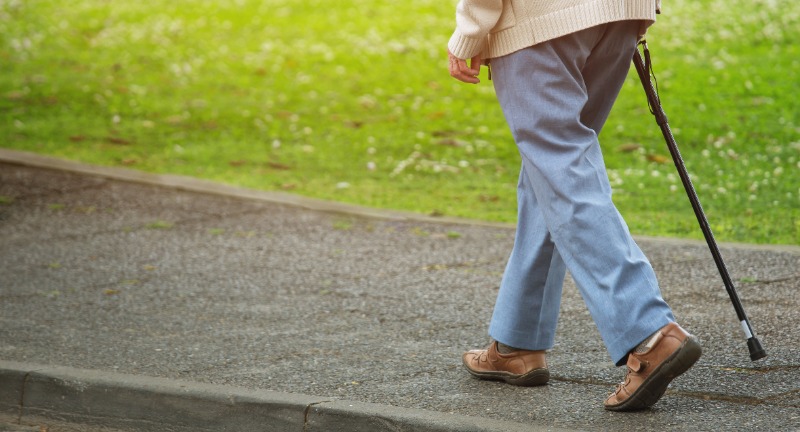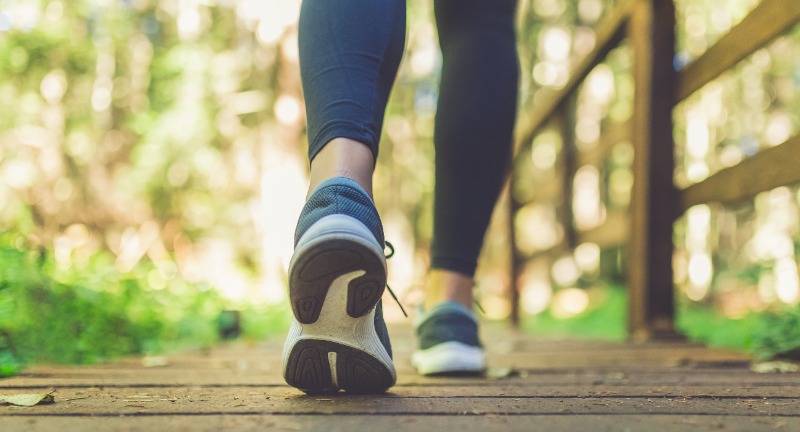
Shutterstock
Walking is one of the most underrated yet powerful tools that can help transform your health and well-being. If you’re aiming to boost your energy, improve your mood, or stay physically fit, a simple daily walk offers a wealth of benefits for both body and mind. It’s a low-impact activity accessible to nearly everyone, and its effects are profound, from strengthening your heart to sharpening your focus.
Beyond the physical advantages, there are other great benefits of walking daily, including reducing stress, spark creativity, and even deepen your connection with nature or loved ones. Let’s take a look at even more benefits of making walking a part of your daily routine.
Improves Cardiovascular Health

Shutterstock
Walking is a natural way to strengthen your heart and improve circulation. As you move, your heart pumps more blood throughout your body, reducing the risk of heart disease and stroke. Over time, a consistent walking routine can lower blood pressure and cholesterol levels. It’s a simple activity that builds long-term resilience for your cardiovascular system.
Boosts Lung Capacity

Shutterstock
Taking a brisk walk increases your breathing rate, allowing your lungs to work harder and take in more oxygen. This not only improves respiratory efficiency but also strengthens your diaphragm and other muscles involved in breathing. Regular walking ensures better oxygen delivery to cells, enhancing overall vitality. Plus, fresh air can clear your mind and leave you feeling rejuvenated.
Aids in Weight Management

Shutterstock
Walking daily is a manageable way to burn calories without intense physical strain. Whether it’s a slow stroll or a brisk pace, the activity boosts your metabolism and helps in maintaining a healthy weight. Combined with mindful eating, walking can also prevent weight gain over time. The best part? It’s adaptable to any fitness level and fits easily into a busy schedule.
Strengthens Bones and Joints

Shutterstock
Walking is a low-impact exercise that stimulates bone-building activity, helping maintain bone density. It also keeps your joints lubricated, reducing stiffness and preventing arthritis-related pain. Over time, this gentle movement strengthens the muscles supporting your bones and joints, improving overall stability. As you age, walking becomes a key ally in preserving mobility and independence.
Enhances Muscle Tone

Shutterstock
Regular walks work multiple muscle groups, including your calves, thighs, glutes, and even your core. Swinging your arms while walking activates your upper body, making it a full-body workout. Over time, this activity can improve muscle endurance and definition. You’ll notice a leaner, more toned physique with minimal effort.
Reduces the Risk of Diabetes

Shutterstock
A daily walk can be a powerful tool for regulating blood sugar levels. Physical activity helps muscles absorb glucose more efficiently, reducing the strain on your pancreas. This not only lowers the risk of Type 2 diabetes but also helps those already diagnosed manage their condition. Walking after meals is particularly effective in stabilizing blood sugar spikes.
Boosts Immunity

Shutterstock
Walking stimulates the movement of white blood cells, which are vital for fighting infections. Improved circulation ensures that immune cells reach different parts of your body more efficiently. Regular walking can also reduce inflammation, a key factor in chronic diseases. With a strengthened immune system, you’re better equipped to ward off illnesses year-round.
Improves Posture

Shutterstock
Walking with proper form encourages spinal alignment and strengthens back muscles. It helps counteract the effects of prolonged sitting, which often leads to slouching and discomfort. A consistent walking routine can improve your body’s natural balance and alignment. Over time, you’ll stand taller, feel more confident, and experience less back pain.
Enhances Balance and Coordination

Shutterstock
Every step you take engages your core, legs, and even your arms, improving balance. Walking on varied terrain, such as trails or hills, further challenges your coordination. This benefit is particularly important as we age, helping prevent falls and injuries. With each walk, you’re training your body to stay steady and agile.
Reduces Chronic Pain

Shutterstock
Walking increases circulation, which can help alleviate pain in areas like the lower back and knees. The gentle movement keeps joints flexible and reduces stiffness, particularly in conditions like arthritis. Endorphins released during a walk can also act as natural painkillers. Over time, walking becomes a sustainable method to manage and even reduce chronic discomfort.
Reduces Stress

Shutterstock
Walking serves as a powerful stress-relief tool by calming your nervous system. It lowers cortisol levels, helping to reduce feelings of tension and anxiety. Walking in green spaces further amplifies this effect, offering a sense of peace and mindfulness. Even a short stroll can leave you feeling more relaxed and grounded.
Boosts Mood

Shutterstock
The rhythmic nature of walking triggers the release of endorphins, which naturally uplift your mood. Whether it’s a walk in the park or a stroll around your neighborhood, this activity combats symptoms of depression. Walking also creates a sense of routine and accomplishment, which can improve your overall outlook on life. It’s a simple act with profound emotional benefits.
Improves Mental Clarity

Shutterstock
Walking increases blood flow to the brain, sharpening your focus and improving cognitive function. It’s a great way to clear mental clutter, making room for creative ideas and productive thoughts. A daily walk has even been linked to improved memory and reduced risk of cognitive decline. When you walk, you’re not just exercising your body—you’re energizing your mind.
Enhances Creativity

Shutterstock
Taking a walk can stimulate your brain and inspire fresh ideas. The change of environment and gentle physical activity often lead to breakthroughs in problem-solving. Many creative thinkers, including writers and artists, use walking to spark their imagination. If you’re feeling stuck, a walk can be just the mental reset you need.
Promotes Better Sleep

Shutterstock
Walking helps regulate your circadian rhythm, making it easier to fall asleep and stay asleep. Physical activity also reduces stress and anxiety, two common culprits of insomnia. An evening stroll can act as a natural wind-down routine, preparing your body for restful sleep. Over time, your sleep quality and energy levels will significantly improve.
Boosts Self-Esteem

Shutterstock
Setting and achieving a daily walking goal fosters a sense of accomplishment. This consistency reinforces your belief in your ability to follow through on commitments. As your physical health improves, you’ll also feel more confident in your appearance. Walking builds both inner and outer strength, boosting self-worth.
Increases Energy Levels

Shutterstock
Walking is a natural energy booster that gets your blood pumping and oxygen flowing. Unlike caffeine or sugar, the energy from walking doesn’t come with a crash. It revitalizes your body and clears mental fatigue, leaving you feeling refreshed. Incorporating walks into your day ensures you stay energized and alert.
Promotes Longevity

Shutterstock
Regular walking has been linked to a longer lifespan by reducing the risk of chronic diseases. It improves your overall quality of life, keeping you healthier and more active as you age. Walking daily contributes to physical, mental, and emotional resilience. In essence, it’s a simple habit that adds years to your life and life to your years.
Strengthens Social Connections

Shutterstock
Walking with others, whether friends, family, or neighbors, strengthens bonds and builds relationships. It’s a chance to share conversations, laughter, and meaningful moments. Group walks also create a sense of community, enhancing your social life. Walking together fosters connections that benefit both mental and emotional well-being.
Accessible to All

Shutterstock
One of the most appealing aspects of walking is that it’s universally accessible. You don’t need special equipment or skills, and it can be done virtually anywhere. It’s a form of exercise that adapts to your pace and preference, making it suitable for people of all ages and fitness levels. Walking is truly an inclusive way to stay active.
Enhances Connection to Nature

Shutterstock
A walk outdoors allows you to immerse yourself in the sights, sounds, and smells of nature. This connection promotes mindfulness and reduces feelings of stress and overwhelm. Being in nature during your walks can even improve your sense of well-being and happiness. It’s a simple way to recharge your mind and body.
Increases Productivity

Shutterstock
Taking breaks to walk during work hours improves focus and problem-solving abilities. Walking enhances blood flow to the brain, which can help you tackle tasks with renewed energy. Even a short walk can clear your mind and provide fresh insights. Over time, these productive breaks can lead to more efficient and creative work.
Supports Financial Health

Shutterstock
Unlike many forms of exercise, walking is completely free and doesn’t require a gym membership. Regular walks can also reduce healthcare costs by preventing chronic illnesses. It’s a budget-friendly way to stay fit and maintain overall health. Walking proves that taking care of yourself doesn’t have to come with a hefty price tag.
Cultivates Discipline

Shutterstock
Committing to a daily walk builds a habit of discipline and consistency. Over time, this practice strengthens your ability to follow through on goals in other areas of life. Walking becomes a metaphor for perseverance: one step at a time. The sense of routine it provides creates a foundation for lasting personal growth.
Conclusion

Shutterstock
Incorporating a daily walk into your life is a small step that leads to significant, long-lasting benefits. From improving your physical health to enhancing mental clarity and emotional well-being, walking is a simple yet powerful habit with transformative potential. Whether you walk alone for introspection or with others to strengthen connections, the rewards are undeniable. Take that first step today, and watch as your body, mind, and spirit thrive with each stride.


























































